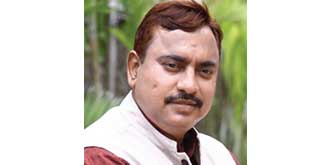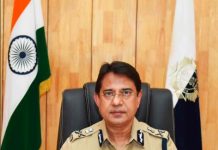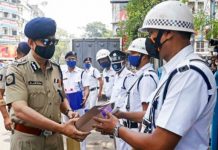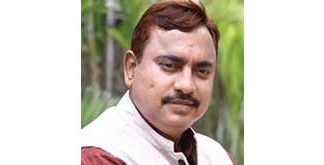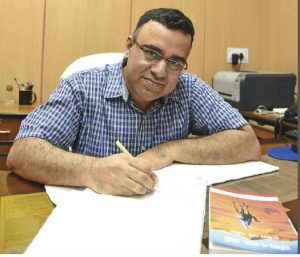
“With the passage of time Bollywood has weaved a stereotype image of the state of Haryana in the minds of the common people of India,” asserts Murlidhar Sharma.
The state has been the cradle of wrestling and has gifted some of the best-known fighters to the nation. This noble son from Haryana has fought multiple bouts with society and emerged victorious by launching his first collection of Urdu poetry, Shayari (poetries) Haasil e Sahranavardi (What is retrieved through wandering in a desert).
Since childhood, Murlidhar developed a likeness for the Urdu language. “Though Partition sketched a boundary between the two nations—India and Pakistan—it has never really stalled the socio-cultural expansion and exchange. Thus, Urdu as a language, stretched beyond the confines of political territories and spread its charm across the northern states of India and also in our neighbouring country Pakistan, explained the JNU alumnae. “Urdu is a language born in India and it’s an integral part of our culture and heritage”, adds Murli.
Haryana Urdu Academy was established in 1958 to promote and preserve this rich language. Over the years, it has rolled out a slew of schemes to promote Urdu amongst the young generation.
“Urdu is never a language of a particular community and around 75% of Urdu words have their etymological roots in Sanskrit and Prakrit and approximately 99% of Urdu verbs have their roots in Sanskrit and Prakrit”, informs the young IPS sitting at his chamber on the 3rd floor of Lalbazar.
During his childhood, Murlidhar Sharma used to attend nashishts (sittings) of Urdu poets and would only listen without letting them know that he wrote ghazals as well. As he was not well versed with meters, he was not keen to let others know about his ghazals. Murli is indeed thankful to the City of Joy for making him discover this new talent in him—an Urdu poet. In this city, he has been able to master the language. He says: “I am indebted to the Maulana Saheb of the mosque near my office. He has been relentlessly teaching me Urdu for quite some years now. I am indeed happy to say that I can both read and write this language of great cultural heritage.”
He remembers the occasion when Wasim Bareili complimented him, saying: “If a police officer in our country can write likes this, I bet, our country is in the safe hands.” Murlidhar Sharma believed that the language has enough potential to be popular among the masses. “In this digital era, even if you cannot read the script, you can definitely go through the translated works in so many languages. Take the case of Bollywood lyricists where most of them are Urdu poets. In our native Haryana, Urdu officially became the second language in the early ’90s. Since so many people have settled down here from Pakistan, we have Urdu roots in our country. Even today, I am always keen to buy new books on Urdu. In my earlier days, whenever I went to Delhi, I always made sure to buy new ones from shops near the Red Fort.”
Language is never a barrier and he also acknowledges that with his experience. “Often we end up correlating language with religion but all these are due to the Britishers who tried to create divisions among us. Believe me, I have realized time and again, Urdu is the language of the soul. In your moments of happiness or solitude or bereavement–couplets of immense poetic depth can give you company. Therein lies the beauty of the language,” says the young officer.
There is a popular belief that poetry comes to people when they are in solitude. But Murlidhar Sharma has a unique story. He can be seen tapping away on his smartphone, writing a couplet even when he is busy in a rally, maintaining law and order and in the late hours, the poet in him brings out moments of literary grandeur. He is known in the literary world as “Murlidhar Taalib”. Incidentally, he has named his first book of shayari (poetries) Haasil e Sahranavardi which means ‘what is retrieved through wandering in a desert’. At present, he is writing his next book which is expected to be released early next year.

